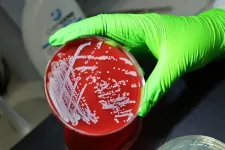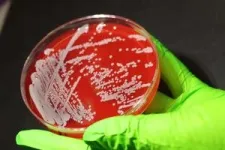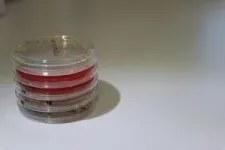(Press-News.org) The most detailed study to date on the mechanisms by which a common type of bacterium, Staphylococcus aureus, adapts to living on the human body could help improve the prevention, diagnosis, and treatment of certain infections.
The study, from the Wellcome Sanger Institute, the University of Cambridge, the Institute of Biomedicine of Valencia (IBV) at the Spanish National Research Council (CSIC) and their collaborators, involved using the genomes of thousands of S. aureus isolates cultured from the human nose and on the skin to investigate which genes are important for the bacteria to adapt and persist.
Published today (13 January) in Nature Communications, they used a new approach of analysing the genomes of bacteria from human carriers, to highlight exactly how these bacteria adapt in their natural habitat. This revealed key mutations that enable certain strains to evade the human immune system and become resistant to antibiotics.
This large-scale genetic analysis uncovered several genes and biological pathways that were not previously known to be involved in S. aureus colonisation.
Further investigation is now required to fully understand the role these play in human colonisation, and if there is a way to target these pathways in the future to help prevent, diagnose or treat infections caused by S. aureus.
Bacteria are commonly found in or on the body without causing harm, known as colonisation. One of these is S. aureus, a common type of bacteria that can be found in the nose of up to 30 per cent of the population worldwide as well as on the skin or in the intestine1.
However, in those with a weakened immune system, S. aureus can get into the bloodstream and cause infections. These can range from mild skin and soft tissue infections to more severe infections, including sepsis and pneumonia1.
This new study is the first time researchers have carried out a large-scale genetic analysis of S. aureus from samples of human carriers, instead of observing the bacteria in a laboratory setting.
The international team analysed the genomes of more than 7,000 S. aureus samples obtained from more than 1,500 human carriers to identify genetic changes that originated in the bacteria while it was in its natural environment. Through computational analysis, they were able to identify the recurrent genetic changes in the bacteria that could have contributed to survival during human colonisation.
The researchers identified changes in genes associated with nitrogen metabolism, suggesting that this is a key metabolic process necessary for the colonisation of humans by S. aureus. They also identified mutations in genes that could influence the way the bacteria interact with human cells and the immune system.
Researchers found that some S. aureus strains have mutations in genes that are involved with regulating the factors the bacteria use to escape the human immune system, possibly highlighting an immune system evasion strategy. Researchers also suggest that these bacterial strains might use factors secreted by other bacterial strains to colonise humans without producing these themselves – something they call ‘cheater’ cells.
Additionally, this study confirmed that S. aureus acquires resistance mutations to antibiotics such as fusidic acid, mupirocin, and trimethoprim.
Overall, this new research reveals key biological processes that S. aureus employs to survive in humans. The study of the evolution and genetic adaptation of bacteria in their natural environment, either during the asymptomatic colonisation of their carriers or in the establishment and course of infections, can help improve the prevention, diagnosis, and treatment of disease.
Dr Francesc Coll, first author from the Institute of Biomedicine of Valencia at the Spanish National Research Council (CSIC), said: “Understanding how bacteria respond to antibiotic treatments has made it possible to identify the genetic changes that allow them to survive the attack of antibiotics. These mutations can be used as diagnostic markers, as well as to design new therapeutic strategies and a more rational and effective use of antibiotics. Studies of bacterial adaptation like this could also reveal mechanisms of immune evasion – how bacteria adapt to evade recognition and attack by our immune system. This could help identify new antigens, components of the bacteria that the immune system recognises as foreign or dangerous, and design new vaccines.”
Dr Ewan Harrison, senior author from the Wellcome Sanger Institute, said: “While Staphylococcus aureus bacteria are harmless to many people, for others they can cause potentially life-threatening infections. Our study gives a detailed new understanding of how these bacteria adapt and evolve in order to survive on and in their human carriers at a genetic level. Through our new analysis, we were able to study these strains in their natural habitat; highlighting previously unknown mutations that give certain Staphylococcus aureus strains the upper hand. We hope that further investigation of the pathways we have uncovered will help improve the prevention, diagnosis, and treatment of infections caused by these bacteria.”
ENDS
Contact details:
Rachael Smith
Press Office
Wellcome Sanger Institute
Cambridge, CB10 1SA
Email: press.office@sanger.ac.uk
Notes to Editors:
B. P. Howden, S.G. Giulieri, T. Wong Fok Lung, et al. (2023) Staphylococcus aureus host interactions and adaptation. Nat Rev Microbiol. DOI: 10.1038/s41579-023-00852-y
Publication:
F. Coll, B. Blane, K. Bellis, et al. (2025) The mutational landscape of Staphylococcus aureus during colonisation. Nature Communications. DOI:10.1101/2023.12.08.570284v1
Funding:
This research was part-funded by Wellcome. A full acknowledgment list can be found on the publication.
Selected websites:
University of Cambridge
The University of Cambridge is one of the world’s top ten leading universities, with a rich history of radical thinking dating back to 1209. Its mission is to contribute to society through the pursuit of education, learning and research at the highest international levels of excellence.
The University comprises 31 autonomous Colleges and 150 departments, faculties and institutions. Its 24,450 student body includes more than 9,000 international students from 147 countries. In 2020, 70.6% of its new undergraduate students were from state schools and 21.6% from economically disadvantaged areas.
Cambridge research spans almost every discipline, from science, technology, engineering and medicine through to the arts, humanities and social sciences, with multi-disciplinary teams working to address major global challenges. Its researchers provide academic leadership, develop strategic partnerships and collaborate with colleagues worldwide.
The University sits at the heart of the ‘Cambridge cluster’, in which more than 5,300 knowledge-intensive firms employ more than 67,000 people and generate £18 billion in turnover. Cambridge has the highest number of patent applications per 100,000 residents in the UK. www.cam.ac.uk
The Wellcome Sanger Institute
The Wellcome Sanger Institute is a world leader in genomics research. We apply and explore genomic technologies at scale to advance understanding of biology and improve health. Making discoveries not easily made elsewhere, our research delivers insights across health, disease, evolution and pathogen biology. We are open and collaborative; our data, results, tools, technologies and training are freely shared across the globe to advance science.
Funded by Wellcome, we have the freedom to think long-term and push the boundaries of genomics. We take on the challenges of applying our research to the real world, where we aim to bring benefit to people and society.
Find out more at www.sanger.ac.uk or follow us on Twitter, Instagram, Facebook, LinkedIn and on our Blog.
About Wellcome
Wellcome supports science to solve the urgent health challenges facing everyone. We support discovery research into life, health and wellbeing, and we’re taking on three worldwide health challenges: mental health, infectious disease and climate and health. https://wellcome.org/
END
Bacterial survival genes uncovered using evolutionary map
2025-01-13
ELSE PRESS RELEASES FROM THIS DATE:
Sodium-ion batteries need breakthroughs to compete
2025-01-13
Legions of battery engineers and their supporters have sought for years to build batteries cheaper than the dominant lithium-ion technology, hoping to capture some of lithium-ion’s $50 billion-a-year and growing market. The latest darling contender among researchers, startups, and venture capitalists – sodium-ion batteries – has received much attention after COVID-induced mineral supply chain challenges sent lithium prices on a wild ride. Still, achieving a low-cost contender may be several years away for sodium-ion batteries and will require a set of technology advances and favorable ...
Tumor DNA in the blood can predict lung cancer outcome
2025-01-13
Scientists from the Francis Crick Institute, UCL, UCLH and Personalis have found that a test to detect circulating tumour DNA can predict lung cancer outcome in a Cancer Research UK-funded study.
Circulating tumour DNA (ctDNA) is fragments of DNA released into the blood by tumours. It’s known to be important for disease prognosis but can be difficult to measure precisely.
In research published today in Nature Medicine, Crick and UCL scientists worked with Personalis to test a platform called NeXT Personal, which can detect very small amounts – 1 part per million – ...
New study unveils breakthrough in understanding cosmic particle accelerators
2025-01-13
Scientists have come a step closer to understanding how collisionless shock waves – found throughout the universe – are able to accelerate particles to extreme speeds.
These shock waves are one of nature's most powerful particle accelerators and have long intrigued scientists for the role they play in producing cosmic rays – high-energy particles that travel across vast distances in space.
The research, published today in Nature Communications, combines satellite observations from NASA’s MMS (Magnetospheric Multiscale) and THEMIS/ARTEMIS missions with recent theoretical advancements, offering a comprehensive new model ...
Previous experience affects family planning decisions of people with hereditary dementia
2025-01-13
Living in a family where there is genetic risk for dementia significantly affects choices about having children and how to parent, finds a new study led by UCL researchers.
The research, published in the Journal of Genetic Counselling, interviewed 13 people – both parents and non-parents – who are at risk of developing familial frontotemporal dementia (fFTD).
This form of dementia often begins in mid-life and is characterised by behavioural and personality changes. Children of an affected parent are at 50% risk of inheriting the gene that causes the disease.
People in affected families fall into three groups: people who don’t choose to find out whether ...
Does obesity affect children’s likelihood of survival after being diagnosed with cancer?
2025-01-13
A recent population-based study indicates that among children with cancer, those with obesity at the time of diagnosis may face an elevated risk of dying. The findings are published by Wiley online in CANCER, a peer-reviewed journal of the American Cancer Society.
The retrospective study was based on information from the Cancer in Young People in Canada (CYP-C) database, including all children with newly diagnosed cancer aged 2 to 18 years across Canada from 2001 to 2020. Obesity was defined as age and sex-adjusted body mass index at or above the 95th percentile.
Among ...
Understanding bias and discrimination in AI: Why sociolinguistics holds the key to better Large Language Models and a fairer world
2025-01-13
The language ‘engines’ that power generative artificial intelligence (AI) are plagued by a wide range of issues that can hurt society, most notably through the spread of misinformation and discriminatory content, including racist and sexist stereotypes.
In large part these failings of popular AI systems, such as ChatGPT, are due to shortcomings with the language databases upon which they are trained.
To address these issues, researchers from the University of Birmingham have developed a novel framework for better understanding large language ...
Safe and energy-efficient quasi-solid battery for electric vehicles and devices
2025-01-13
Technological advances have led to the widespread use of electric devices and vehicles. These innovations are not only convenient but also environmentally friendly, offering an alternative to polluting fuel-driven machines. Lithium ion batteries (LIBs) are widely used in electrical appliances and vehicles. Commercial LIBs comprise an organic electrolyte solution, which is considered indispensable to make them energy efficient. However, ensuring safety becomes a concern and may be difficult to achieve with the rising market demand.
While solid-state batteries can help mitigate safety issues, the interface between solid electrodes and the ...
Financial incentives found to help people quit smoking, including during pregnancy
2025-01-13
Rewards and financial incentives are successful methods to help people quit smoking, according to a new Cochrane review co-led by a University of Massachusetts Amherst public health and health policy researcher. For the first time, the researchers also found “high-certainty evidence” that this intervention works for pregnant people as well.
A previous review of studies, also published in the Cochrane Database of Systematic Reviews, found moderate certainty that financial ...
Rewards and financial incentives successfully help people to give up smoking
2025-01-13
Offering rewards helps people to stop smoking, with success rates continuing long after incentives have stopped.
The new research, led by the University of East Anglia, also explored whether incentives were effective in helping pregnant women to give up smoking.
While previous research found rewards played a moderate role in encouraging pregnant women to quit smoking, this up-to-date study found there is now “high certainty evidence” that such schemes are successful in this ...
HKU ecologists reveal key genetic insights for the conservation of iconic cockatoo species
2025-01-12
Ecologists at the School of Biological Sciences of The University of Hong Kong (HKU) have made valuable discoveries that could transform the conservation of two iconic cockatoo species: the Sulphur-crested cockatoos and the critically endangered Yellow-crested cockatoos – with only 2,000 individuals remaining in the wild for the latter.
Until now, no whole-genome research had been conducted on either species, which were identified solely by subtle morphological differences. Through two innovative studies, the team ...






